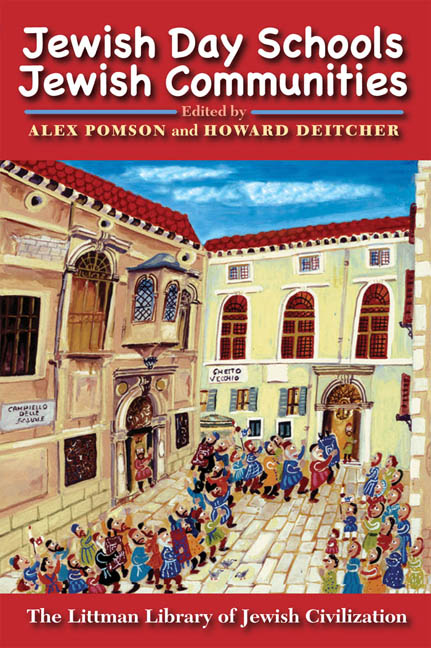Book contents
- Frontmatter
- Dedication
- Acknowledgements
- Contents
- Note on Transliteration
- Introduction: Jewish Schools, Jewish Communities: A Reconsideration
- PART I Insights from Public and General Education
- PART II Cross-Cultural Insights
- 6 Do Jewish Schools Make a Difference in the Former Soviet Union?
- 7 Jewish Pupils’ Perspectives on Religious Education and the Expectations of a Religious Community: The Jewish High School in Berlin
- 8 Mutual Relations between Sheliḥim and Local Teachers at Jewish Schools in the Former Soviet Union
- 9 Community School versus School as Community: The Case of Bet El Community in Buenos Aires
- 10 Beyond the Community: Jewish Day School Education in Britain
- 11 Attitudes, Behaviours, Values, and School Choice: A Comparison of French Jewish Families
- 12 The School Ghetto in France
- PART III Insights through the Prism of Community
- Contributors
- Index
8 - Mutual Relations between Sheliḥim and Local Teachers at Jewish Schools in the Former Soviet Union
from PART II - Cross-Cultural Insights
- Frontmatter
- Dedication
- Acknowledgements
- Contents
- Note on Transliteration
- Introduction: Jewish Schools, Jewish Communities: A Reconsideration
- PART I Insights from Public and General Education
- PART II Cross-Cultural Insights
- 6 Do Jewish Schools Make a Difference in the Former Soviet Union?
- 7 Jewish Pupils’ Perspectives on Religious Education and the Expectations of a Religious Community: The Jewish High School in Berlin
- 8 Mutual Relations between Sheliḥim and Local Teachers at Jewish Schools in the Former Soviet Union
- 9 Community School versus School as Community: The Case of Bet El Community in Buenos Aires
- 10 Beyond the Community: Jewish Day School Education in Britain
- 11 Attitudes, Behaviours, Values, and School Choice: A Comparison of French Jewish Families
- 12 The School Ghetto in France
- PART III Insights through the Prism of Community
- Contributors
- Index
Summary
THE SYSTEM of formal Jewish education in the former Soviet Union (FSU) began to develop during the final years of the Communist regime in major cities such as Riga, Vilna, Moscow, St Petersburg, and Kiev. Since the establishment of the Dubnow Jewish school in Riga in 1989, dozens more Jewish schools have opened throughout the FSU. The first day schools were established at the initiative of local activists, but the major surge came during the 1990s, in the wake of active intervention by Jews overseas. The parties to this endeavour included the Liaison Bureau in Israel (‘Nativ’), the Chabad movement, Karlin hasidim, strictly Orthodox groups of Lithuanian origin, and the Conservative movement.
The Heftzibah Support Programme for Formal Jewish Zionist Education in the FSU was established within the Israeli ministry of education in the early 1990s, on the initiative of the late minister Zevulun Hammer, to support Jewish schools within the territory of the FSU. In fact, the FSU is the only region in the diaspora where the Israeli ministry of education is involved with Jewish education. The aim of those who founded this unique programme was to provide the Jews of the FSU with the Jewish education that had been forcibly denied them for about seventy years. The programme includes financial support for school infrastructure, informal activity related to celebration of Jewish festivals, support for Jewish studies teachers, and the provision of sheliḥim (emissary teachers) from Israel.
Few non-religious Jewish schools in the FSU received support from the programme during the 1990s. Today, however, about forty-three schools participate in the programme; most of their students, who in total number more than 9,000, are Jewish, at least in the sense of qualifying for entitlement to migrate to Israel under the Law of Return. Some seventy sheliḥim, along with more than 200 local teachers, are currently teaching Jewish studies (Hebrew, history, tradition, etc.) at these institutions.
The Heftzibah programme brings together professional teachers (local as well as sheliḥim) of very different social, cultural, and personal backgrounds.
- Type
- Chapter
- Information
- Jewish Day Schools, Jewish CommunitiesA Reconsideration, pp. 155 - 171Publisher: Liverpool University PressPrint publication year: 2009

